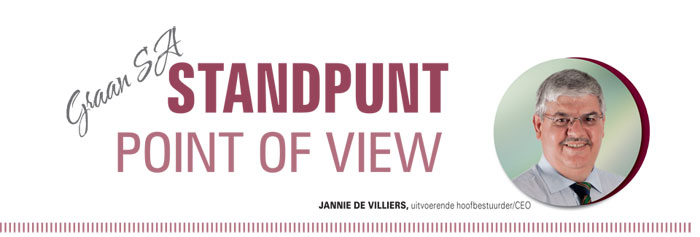June 2015

JANNIE DE VILLIERS, uitvoerende hoofbestuurder/CEO
In 1838 a move from the Cape to the unknown interior started – almost blindly, as a result of circumstances so bad that the unknown was considered a better option.
In my Standard 2 history book it was referred to as the Great Trek. Today we read about it in the National Development Plan (NDP): The urbanisation of the people. The circumstances in rural areas have become so dire that people blindly move to cities in search of a better future.
According to the NDP, 60% of all South Africans currently reside in cities and it is expected that the number could grow to 70% by 2030. The implications of this on the infrastructure of cities are massive, but for commercial agriculture it is a wonderful opportunity, actually.
The more people urbanise, the more people must buy food and cannot produce it for themselves. The future of subsistence farming seems doubtful against this tempo of urbanisation. If I look around me it also seems as if the speed of urbanisation is outstripping the speed of land reform.
The one factor we will, however, have to monitor constantly is that the improvement in the productivity of grain production remains greater than the speed of urbanisation in order to maintain food security. This, in itself, is no mean feat.
In South Africa we have witnessed a large decline in the number of people in the poorest categories of our population and an almost equal increase in the middle class – mostly city dwellers. The group of people who have migrated from the poorer categories, definitely do not consume porridge and bread in the same quantities than before.
They eat chicken, eggs, dairy and meat (and drink beer!). All of these are products requiring the production of larger quantities of grain – most likely not by subsistence farmers, but rather by commercial producers. The “Great Trek” of urbanisation and class migration therefore offer many opportunities to commercial agricultural producers.
What is, however, a matter of concern is that the gap between rich and poor all over the world continues to widen. This leads to more and more conflict and violence. People who at the time in 1838 migrated to an unknown future are still doing it today. There have recently been even more people who endeavoured to cross the Mediterranean Sea or an ocean elsewhere in the world, recklessly, in search of a new future. They are fleeing poverty, violence and a lack of security.
The xenophobic violence in South Africa was a huge embarrassment for our country. However, it remains a symptom of problems in our society related to urbanisation, poverty, poor infrastructure and poor services.
I was listening to a leadership video the other day wherein the commentator highlighted three matters that destroy nations: The gap between rich and poor which is widening; racial hatred; as well as violence/war. It was almost as if he was talking about South Africa. These problems are devastating for our country.
The question is: What can agriculture do about it?
The solutions to this are huge challenges, but while we are searching for solutions, people still have to eat. This is our salvation. One can quite easily shrug one’s shoulders declaring: “It is not my responsibility,” but ostrich politics have never provided permanent solutions resulting in a good future.
Publication: June 2015
Section: Features